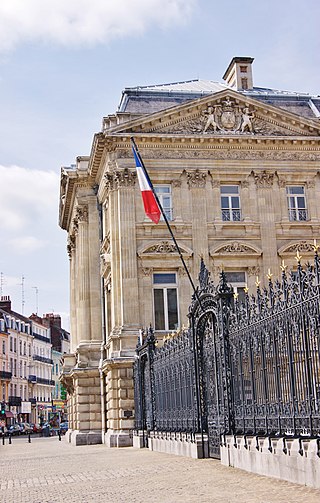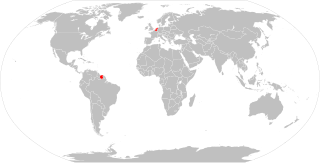
Belgium, officially the Kingdom of Belgium, is a country in Northwestern Europe. The country is bordered by the Netherlands to the north, Germany to the east, Luxembourg to the southeast, France to the south, and the North Sea to the west. It covers an area of 30,689 km2 (11,849 sq mi) and has a population of more than 11.7 million, making it the 22nd most densely populated country in the world and the 6th most densely populated country in Europe, with a density of 383/km2 (990/sq mi). Belgium is part of an area known as the Low Countries, historically a somewhat larger region than the Benelux group of states, as it also included parts of northern France. The capital and largest metropolitan region is Brussels; other major cities are Antwerp, Ghent, Charleroi, Liège, Bruges, Namur, and Leuven.
Brabant is a traditional geographical region in the Low Countries of Europe. It may refer to:

Flanders is the Dutch-speaking northern portion of Belgium and one of the communities, regions and language areas of Belgium. However, there are several overlapping definitions, including ones related to culture, language, politics, and history, and sometimes involving neighbouring countries. The demonym associated with Flanders is Fleming, while the corresponding adjective is Flemish, which can also refer to the collective of Dutch dialects spoken in that area, or more generally the Belgian variant of Standard Dutch. The official capital of Flanders is the City of Brussels, although the Brussels-Capital Region that includes it has an independent regional government. The powers of the government of Flanders consist, among others, of economic affairs in the Flemish Region and the community aspects of Flanders life in Brussels, such as Flemish culture and education.

Nord is a département in Hauts-de-France region, France bordering Belgium. It was created from the western halves of the historical counties of Flanders and Hainaut, and the Bishopric of Cambrai. The modern coat of arms was inherited from the County of Flanders.

Belgium is a federal state comprising three communities and three regions that are based on four language areas. For each of these subdivision types, the subdivisions together make up the entire country; in other words, the types overlap.

Zeelandic Flanders is the southernmost region of the province of Zeeland in the south-western Netherlands. It lies south of the Western Scheldt that separates the region from the remainder of Zeeland and the Netherlands to the north. Zeelandic Flanders is bordered to the south and to the east by Belgium.

"De Vlaamse Leeuw" is the official anthem of Flanders, a region and community in Belgium.

The Dutch Language Union is an international regulatory institution that governs issues regarding the Dutch language. It is best known for its spelling reforms which are promulgated by member states, grammar books, the Green Booklet and its support of Dutch language courses and studies worldwide. It was founded on a treaty concluded between the Netherlands and Belgium on 9 September 1980. Suriname has been an associate member of the Taalunie since 2004.
Flanders is the country of the Flemings; since several decades ago, it is also a community and a region in Belgium. Geographically and historically, Flanders also covers parts of France and The Netherlands but may also refer to:

The Flemish Region, usually simply referred to as Flanders, is one of the three regions of Belgium—alongside the Walloon Region and the Brussels-Capital Region. Covering the northern portion of the country, the Flemish Region is primarily Dutch-speaking. With an area of 13,626 km2 (5,261 sq mi), it accounts for only 45% of Belgium's territory, but 58% of its population. It is one of the most densely populated regions of Europe with around 500/km2 (1,300/sq mi).

The Flemish Community is one of the three institutional communities of Belgium, established by the Belgian constitution and having legal responsibilities only within the precise geographical boundaries of the Dutch-language area and of the bilingual area of Brussels-Capital. Unlike in the French Community of Belgium, the competences of the Flemish Community have been unified with those of the Flemish Region and are exercised by one directly elected Flemish Parliament based in Brussels.

Belgians are people identified with the Kingdom of Belgium, a federal state in Western Europe. As Belgium is a multinational state, this connection may be residential, legal, historical, or cultural rather than ethnic. The majority of Belgians, however, belong to two distinct linguistic groups or communities native to the country, i.e. its historical regions: Flemings in Flanders, who speak Dutch, West Flemish and Limburgish; and Walloons in Wallonia, who speak French or Walloon. There is also a substantial Belgian diaspora, which has settled primarily in the United States, Canada, France, and the Netherlands.
Parliament of Flanders may refer to:

The Kingdom of Belgium has three official languages: Dutch, French, and German.
Kapelle may refer to the following places:
The partition of Belgium is a hypothetical situation, which has been discussed by both Belgian and international media, envisioning a split of Belgium along linguistic divisions, with the Flemish Community (Flanders) and the French-speaking Community (Wallonia) becoming independent states. Alternatively, it is hypothesized that Flanders could join the Netherlands and Wallonia could join France or Luxembourg.
Dutch dialects are primarily the dialects that are both cognate with the Dutch language and spoken in the same language area as the Dutch standard language. They are remarkably diverse and are found within Europe mainly in the Netherlands and northern Belgium.
Smet is a Dutch occupational surname. Smet is a regional form of Smid ("Smith") and is equivalent to the more abundant surname Smit. It is common in East Flanders. People named Smet include:

Flemish people or Flemings are a Germanic ethnic group native to Flanders, Belgium, who speak Flemish Dutch. Flemish people make up the majority of Belgians, at about 60%.

Flemish (Vlaams) is a Low Franconian dialect cluster of the Dutch language. It is sometimes referred to as Flemish Dutch, Belgian Dutch, or Southern Dutch. Flemish is native to the region known as Flanders in northern Belgium; it is spoken by Flemings, the dominant ethnic group of the region. Outside of Belgium Flanders, it is also spoken to some extent in French Flanders and the Dutch Zeelandic Flanders.









